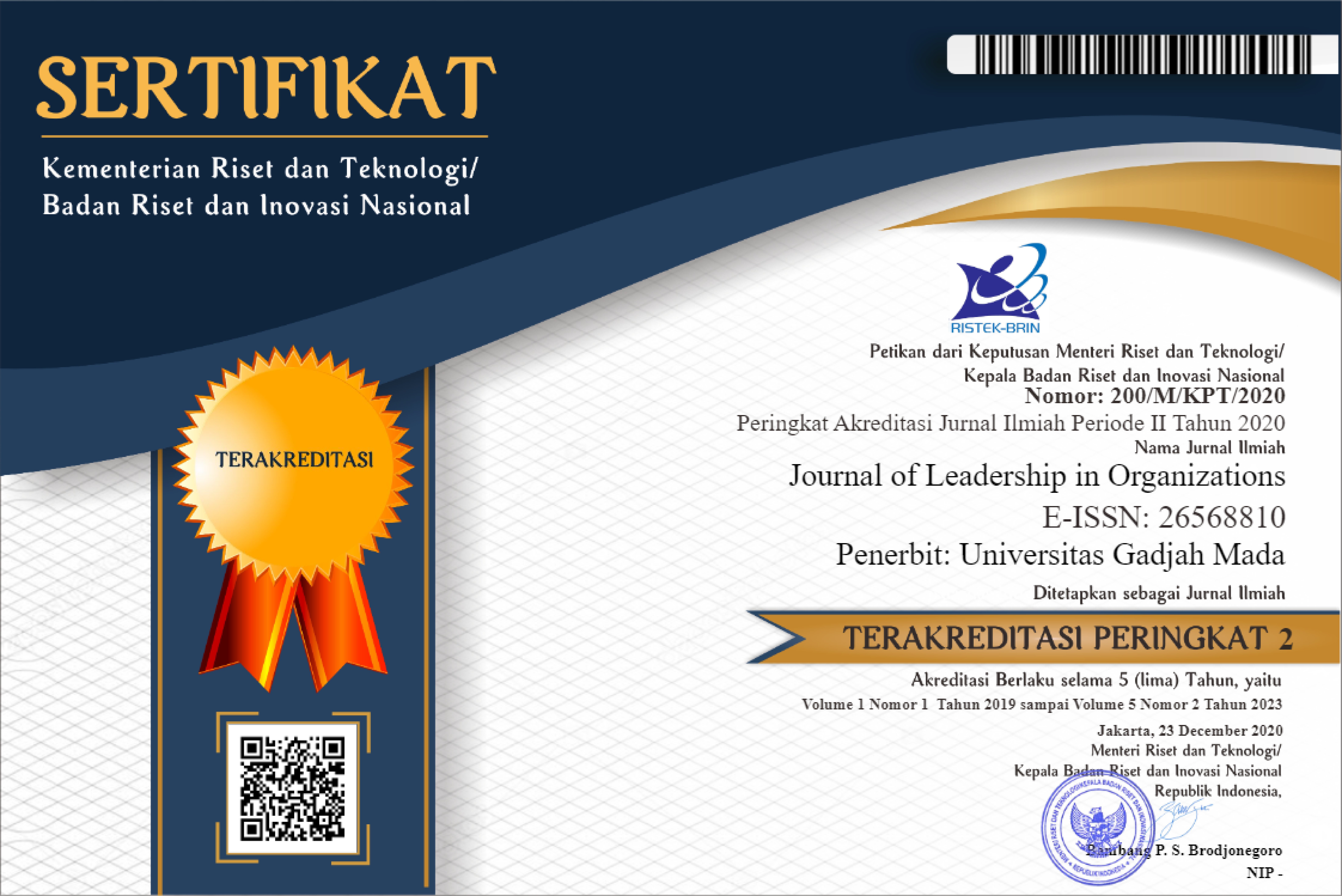Leadership traits as the basis for effective interaction between the leader and the team
Nataliia Aliekperova(1), Adyl Aliekperov(2*)
(1) BOGOMOLETS NATIONAL MEDICAL UNIVERSITY
(2) Independent researcher
(*) Corresponding Author
Abstract
Introduction/Main Objectives: The study proposed is written based on the results of quantitative research and the analysis of the theory and practice of leadership. The study's main objective is to determine the essential traits of a leader for effective interaction with team members. Background Problems: Most research on this topic chose a leader's traits based on analyzing literary sources rather than on empirical research. Novelty: The traits for the most effective collaboration between leader and team members were chosen by potential and actual members of the leader's team, namely students and teachers of the University. Research Methods: We conducted a questionnaire survey of 103 teachers and 421 Bogomolets National Medical University (Kyiv) students. The statistical analysis was carried out using Wald Test. Finding/Results: The research confirmed that both respondent categories admitted the importance of all leadership traits. At the same time, such traits as passion, effectiveness, self-confidence, determination, and ability to take risks appeared to be more significant for the students than for the teachers. The teachers ranked such a trait as decency higher than the students did. Also, such issues as the importance of organizational culture, ethical aspects of leadership, and the most effective leadership style for productive interaction with team members were examined. Conclusion: This study proposed complex recommendations for creating the most productive model of the interaction between the leader and team members based on the data obtained.
Keywords
Full Text:
PDFReferences
Amazon.com. (2020). Annual report. Retrieved from https://s2.q4cdn.com/299287126/files/doc_financials/2021/ar/Amazon-2020- Annual-Report.pdf. Accessed January 31, 2022.
Armstrong, M. & Stephens, T. (2005). A Handbook of Employee Reward Management and Practice, Kogan Page.
Aliekperov, A. (2020), The empirical verification of the “Universal model of inspiration (UMI)”. Retrieved from https://www.researchgate.net/profile/Adyl-Aliekperov. Accessed January 31, 2022
Adidas. (no data). Our culture. Retrieved from https://www.adidas- group.com/en/about/culture/. Accessed January 31, 2022
Bass, B. (1990). From transactional to transformational leadership: Learning to share the vision. Organizational Dynamics, Volume 18, Issue 3, 19-31.
Berdyaev, N. (1962). The Meaning of the Creative Act. Collier Books.
Bezos, J. (1997). Letter To Shareholders, (Reprinted from the 1997 Annual Report). Retrieved from https://www.aboutamazon.com/news/company-news/2020-letter-to- shareholders#:~:text=The%20past%20year's%20success%20is,element%20of%20Amazon.com's%20success. Accessed January 31, 2022.
Bhattacherjee, A. (2012). Social Science Research: Principles, Methods, and Practices. Textbooks Collection. 3. Retrieved from http://scholarcommons.usf.edu/oa_textbooks/3 Accessed January 26, 2023.
Britannica. (2021). Starbucks, American company. Retrieved from https://www.britannica.com/topic/Starbucks#:~:text=Starbucks%20was%20fou nded%20by%20Jerry,all%20loved%20coffee%20and%20tea. Accessed January 31, 2022.
Blanchard, K. (2007). The heart of a leader. David C Cook.
Burns, J.M. (2003) Transforming Leadership. Grove Press.
Cameron, Kim S. & Quinn, Robert E. (2011). Diagnosing and Changing Organizational Culture. John Wiley & Sons.
Carlyle, T. (1841). On Heroes, Hero-Worship, and the Heroic in History. Yale University Press.
Cambridge Dictionary. (no data). Meaning of intelligence in English. Retrieved from https://dictionary.cambridge.org/dictionary/english/intelligence. Accessed January 24, 2022.
Cambridge Dictionary. (no data). Meaning of passion in English. Retrieved from https://dictionary.cambridge.org/dictionary/english/passion Accessed January 24, 2022.
Drucker, P. (2008). Management (revised edition). Harper Collins e-book.
Gillam, S. (2008). Steve Jobs: Apple & IPod. Wizard, ABDO.
General Electric. (2020). Jack Welch, The ‘Ultimate Manager’ Who Oversaw GE’s Rise To The Most Valuable Company, Dies at 84. Retrieved from https://www.ge.com/news/reports/jack-welch-the-ultimate-manager-who- oversaw-ges-rise-to-the-most-valuable-company-dies-at-84 Accessed January 31, 2022.
Hogue, W. (2013) Elements of Leaders of Character. West Bow Press.
House, R., & Aditya, R. (1997). The social scientific study of leadership: Quo vadis? Journal of Management, 23, 409–473.
Hunter, J. (2004). The World's Most Powerful Leadership Principle: How to Become a Servant Leader. Crown business.
Isaacson, W. (2012). The Real Leadership Lessons of Steve Jobs. Retrieved from https://hbr.org/2012/04/the-real-leadership-lessons-of-steve-jobs. Accessed January 24, 2022.
Kennedy, J. (1963). Remarks prepared for delivery at the trade mart in Dallas, TX, November 22, 1963. Retrieved from
https://www.jfklibrary.org/archives/other-resources/john-f-kennedy- speeches/dallas-tx-trade-mart-undelivered-19631122 Accessed January 24, 2022.
Kim, L. (2016). 50 Innovation and Success Quotes from SpaceX Founder Elon Musk. Retrieved from https://www.inc.com/larry-kim/50-innovation-amp;- success-quotes-from-spacex-founder-elon-musk.html. Accessed January 24, 2022.
Kirkpatrick, S.A. & Locke, E.A. (1991) Leadership: Do Traits Matter? Academy of Management Executive, 5, 48-60.
Kouzes, J. and Posner, B. (1987). The Leadership Challenge. Wiley.
Kouzes, J. & Posner, B. (2013). Great Leadership Creates Great Workplaces. Wiley.
Kumar, R. (2011). Research Methodology: A Step-by-Step Guide for Beginners. 3rd Edition. Sage, New Delhi.
Lord, R. G., de Vader, C. L., & Alliger, G. M. (1986). A meta-analysis of the relation between personality traits and leadership perceptions: An application of validity generalization procedures. Journal of Applied Psychology, 71(3), 402–410. https://doi.org/10.1037/0021-9010.71.3.402
Mann, R. D. (1959). A review of the relationships between personality and performance in small groups. Psychological Bulletin, 56(4), 241–270. https://doi.org/10.1037/h0044587
McDonalds. (2022). Our History. Retrieved from https://www.mcdonalds.com/us/en-us/about-us/our-history.html.. Accessed January 31, 2022.
Northouse, P. (2016). Leadership: Theory and practice (7th ed.) Thousand Oaks.
Schroeder, K. (2021). 3 Reasons Why Business Ethics Is Important. Retrieved from https://www.redlands.edu/study/schools-and- centers/business/sbblog/2019/may-2019/3-reasons-why-business-ethics- important/. Accessed January 24, 2022.
Statista. (2022). Number of Starbucks stores worldwide. Retrieved from https://www.statista.com/statistics/218366/number-of-international-and-us- starbucks-stores/. Accessed January 31, 2022
Stogdill, R. M. (1974). Handbook of leadership. New York: Free Press.
Stogdill, R., (1947). Personal Factors Associated with Leadership: A Survey of the Literature. Retrieved from https://doi.org/10.1080/00223980.1948.9917362. Accessed January 28, 2022
Terman, L. (2021). The Measurement of Intelligence. (Kindle Edition), Namaskar Books.
Tribus, M. (1992). The Germ Theory of Management. SPC Press.
Walliman, N. (2006). Social research methods. London: SAGE publications.
Welch, J. and Welch, S., (2005). Winning (Enhanced Edition). Harper Business.
Yukl, G., & Van Fleet, D. D. (1992). Theory and research on leadership in organizations. Handbook of industrial and organizational psychology (pp. 147–197). Consulting Psychologists Press.
Yukl, G. (1998). Managerial Leadership: A Review of Theory and Research. Journal of Management, 15, 251-289.
http://dx.doi.org/10.1177/014920638901500207
Yukl, G. (1998). Leadership in organizations. Upper Saddle River, NJ: Prentice Hall.
Zaccaro, S. J., Kemp, C., & Bader, P. (2004). Leader traits and attributes. In J. Antonakis, A. T. Cianciolo, & R. J.Sternberg (Eds.), The nature of leadership (pp. 101-124). Thousand Oaks, CA: Sage.
Article Metrics
Refbacks
- There are currently no refbacks.
Copyright (c) 2023 Journal of Leadership in Organizations

This work is licensed under a Creative Commons Attribution-ShareAlike 4.0 International License.
| Journal of Leadership in Organizations |
| Journal of Leadership in Organizations (JLO), with registered number ISSN 2656-8829 (Print) and ISSN 2656-8810 (Online), is published by the Center for Leadership Studies, Department of Management, Faculty of Economics and Business, Universitas Gadjah Mada. The content of this website is licensed under a Creative Commons Attribution-ShareAlike 4.0 International License |
| © 2019 Journal of Leadership in Organizations | |





_logo2.png)


.png)




